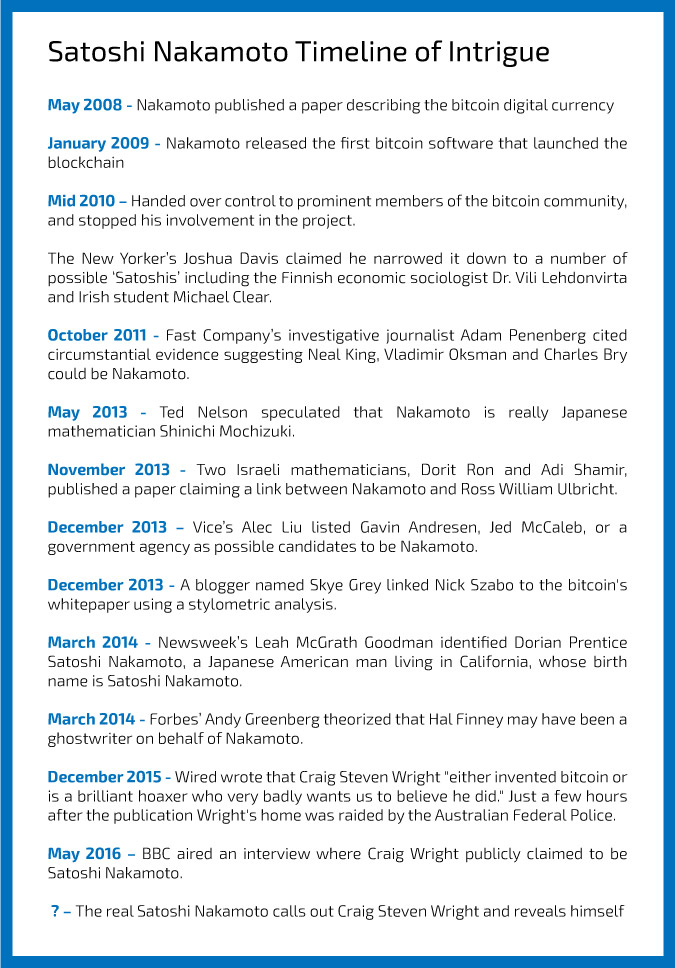Several weeks ago, Craig Wright started spewing lawsuits against those who claimed that he is not Satoshi Nakamoto, the creator of Bitcoin. Apparently, the legal action was an attempt to gain credibility. “This will give me the chance to prove my credentials in front of a judge rather than being judged by Twitter,” he told Bloomberg.
Although the lawsuits were some kind of attempt to gain credibility, they have had a number of serious consequences. The CEOs of several exchanges–including Kraken and Binance–took issue with Wright’s behavior and.
The real Satoshi can digitally sign any message to prove it. This is as simple as breathing for him/her. And we have the pub key.
Until then, everyone is Satoshi, except Craig Wright!
— CZ Binance (@cz_binance)
Indeed, a large portion of the cryptocurrency community has taken serious issue with Wright’s claims that he is Satoshi–most people in the industry agree that there is very little evidence to support his claims, and would like to distance crypto’s image from and apparent desire for control and influence.
Perhaps unsurprisingly, J. Last month, he not only said that Wright isn’t Satoshi–he also claimed that he knows the true identity of Bitcoin’s enigmatic creator, and has started a sort of ‘countdown’: he will continue to release bits and pieces of information about him until he is either forced to reveal his identity or be outed against his will.
The real Satoshi can digitally sign any message to prove it. This is as simple as breathing for him/her. And we have the pub key.
Until then, everyone is Satoshi, except Craig Wright!
— CZ Binance (@cz_binance)
For many who’ve been watching this battle from the outside, all of this raises a rather important question:
Why does it really matter who Satoshi Nakamoto is anyway?
The Mysticism of Blockchain
For Tim Curry, CMO of BlockchainBMT, the answer is “it doesn’t”–and for similar reasons, “nor does the identity of Euclid, considered ‘The Founder of Geometry’ (or ‘Father of Geometry’).”
Curry believes that like Euclid, Nakamoto’s work will proliferate the world without the influence of ego and personality.
“Despite the availability of extensive biographies of Greek mathematicians both before and after Euclid, almost nothing is known about him, and like Satoshi, many believe that Euclid, himself, was a group of people,” Curry told Finance Magnates. “Geometry is inescapable in modern times. Bitcoin and cryptocurrency will also become so, despite the anonymity of its author(s) and original curator(s).”
Nash Foster, CEO of Pyrofex, added that the real Satoshi may choose to remain anonymous forever to keep the mysticism of the character and Bitcoin alive.

And indeed, for many, the culture around blockchain and decentralization is one that has sort of mythical qualities–almost religious qualities.” Perhaps [there is] value in the mystery, after all,” Eran Eyal, Co-founder of Shopin, wrote to Finance Magnates.
“There are many codexes which underpin religions or movements that are more powerful for the anonymity of the author. Perhaps this is the bible of the new economy. But does it matter who really wrote these codexes? Do they not have undeniable value unto themselves?”

But of course, the issue of Satoshi’s identity does extend beyond mysticism–and while blockchain may be a great gift to the world in the long-run, the short-term battle over the identity is affecting the Bitcoin network and the general public’s perception of the cryptocurrency industry.
“In theory, his identity should make no difference. Bitcoin is what it is,” wrote Jeff Stollman, principle consultant at Rocky Mountain Technical Company, in an email to Finance Magnates. “But in practice, fans of Bitcoin lionize the creator of Bitcoin.”

A comparison to the creator of Ethereum is helpful here–“he would have more power than , who has been shying away from being a powerful figure because he recognizes that Ethereum’s success depends on separating personalities from the ‘decentralized’ community that needs to guide Ethereum into the future.”
However, those wishing to claim the identity of Satoshi Nakamoto should be wary of the negative consequences of earing this identity. “He would be followed by paparazzi and his every move would be watched and reported on, removing his privacy,” Stollman continued.
“He may also be subject to a large tax depending on his nationality and Bitcoin transaction history, [and be] hounded by people trying to sell him things in the way that winners of large lotteries are hounded by people pushing investments, charities, et cetera.”
Could Wright Be Satoshi?
Even despite these negative consequences, Wright seems determined to bear the identity of Bitcoin’s creator. But what evidence is there that Wright could, in fact, be Satoshi?
For one thing, “Craig is known to have been involved in Bitcoin at a very early stage,” Tim Curry explained to Finance Magnates. Additionally, “Craig Wright was part of the Cypher Punk movement predating Bitcoin and worked with several computer scientists in the space on related projects (plausibility).”
There’s also the fact that he went so far as to tell the US Government that he is the creator of Bitcoin. “My name is Dr. Craig Wright and under the pseudonym of Satoshi Nakamoto I completed a project I started in 1997 that was filed with the Australian government in part under an AusIndustry project registered with the Dept. of Innovation as BlackNet,” he wrote in.

Evidence that Wright Isn’t Satoshi is Stronger than Evidence that He Is
However, the evidence against Wright’s claims seems to outweigh the evidence that supports them.
“Much of Wright’s biography, particularly his schooling, is largely unverifiable, some of it having been disputed and disproven,” Curry explained.
There are also inconsistencies between Wright’s writing and Satoshi’s writings–”Graphanalysis and Questioned Document Examination (QDE) between a volume of Satoshi’s writings and Wright’s body of work exhibits inconsistencies in patterns, style and grammar between the two.” What’s more, in Wright’s claims that he authored a precursor to the Bitcoin whitepaper in 2001.

Wright did “attempt to fake exactly this requirement and successfully did so with Jon Matonis on May 2, 2016,” Curry said. However, on the same day.
What Will Happen Next?
Will his efforts to be legally proven as Satoshi Nakamoto lead anywhere?
“I think it will result in a lot of embarrassment,” Stollman said. “But he is getting his 30 minutes of fame.”
And Wright’s efforts may have paid off, to some extent–”he may have convinced some people that he is Satoshi and have a loyal following,” Stollman continued. “In fact, he may be Satoshi, for all I know.”
However, even if Wright is legally proven to be Satoshi, he may not be embraced by the cryptocurrency community: “his behavior is not very regal for a leader. So if he eventually proves that he is Satoshi, his aggressiveness will have diminished the respect and power that would come with such recognition.”
And indeed, whether the crypto community would ever accept any “proven” identity of Bitcoin’s creator–whether it’s Wright or John McAfee’s good ol’ buddy–remains to be seen.





Be First to Comment